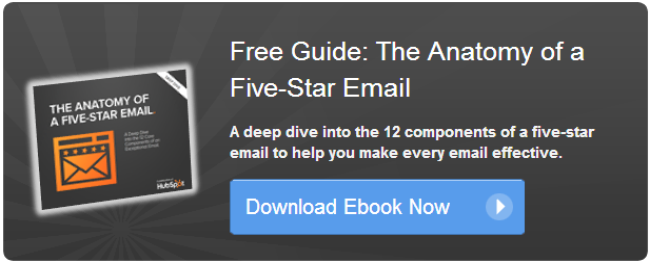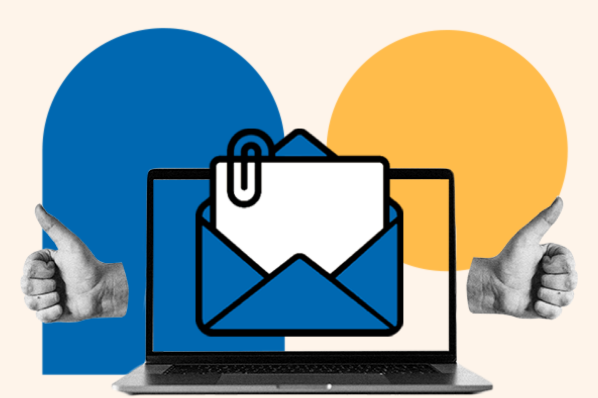 When I first started out with email marketing, I felt lost. I had been handling the blog and social media accounts, then suddenly I had to take on some email duties. I immediately needed to understand things like what a hard bounce was (and how it was different from a soft bounce), how to determine a good clickthrough rate from a bad one, and why my emails looked perfectly fine in Gmail but got completely screwed up in Hotmail.
When I first started out with email marketing, I felt lost. I had been handling the blog and social media accounts, then suddenly I had to take on some email duties. I immediately needed to understand things like what a hard bounce was (and how it was different from a soft bounce), how to determine a good clickthrough rate from a bad one, and why my emails looked perfectly fine in Gmail but got completely screwed up in Hotmail.

I had all of these really basic questions but I couldn't find straight answers online -- and I didn't want to keep bombarding other people with questions either.
To prevent anyone else from being in the same situation I was in, I decided to write one post to answer all of my most burning questions that I felt stupid asking when I first started. So keep reading to get your most burning -- yet basic -- email marketing questions answered. Don't worry, this is a safe space.
1) Should I buy a list just to kick off my email marketing?
No.
You should never be buying lists -- even if people opted in to those lists, they didn't opt in to hear from you. This means when they get an email from you, they'll not just be less likely to open or click on it because they don't know you -- they could mark you as spam because they don't recognize your name. You could also be mucking up your deliverability score by buying lists, which will affect the success of your email marketing long term. And these are just a few of the dangers of buying a list.
2) How do I grow my email marketing list organically, then?
Okay, so if you can't buy email lists, you need to focus on growing your list organically -- this means people must opt in to hear from your company.
One of the most basic ways to grow your list is to create an offer (a piece of content that lives behind a form), and ask for people to give you their email address to access that piece of content. This is just one way to grow your list, but it demonstrates the basic principle behind organic contact database growth. Here are 25 more clever ideas for growing your email database.
3) Where does an email newsletter fit into email marketing?
There are lots of types of emails you can send -- email newsletters are just one kind that fits under the larger umbrella of email marketing. An email newsletter is usually an email on one topic promoting a few different pieces of content, with the goal of getting you to read those pieces of content. Email newsletters may also feature ads or special offers, but they're usually not prominently featured.
Most people think they need an email newsletter, but often your email marketing program will be more effective for building your business if you send really specific content tailored to your marketing funnel. Write content for your audience with the help of our AI Email Writer. Consider spending more time segmenting your lists and sending emails that feature just one piece of content that has the goal of getting recipients to progress further down the marketing funnel instead of rounding up a lot of content to share in a newsletter.
To create effective email marketing campaigns, you can leverage HubSpot's Campaign Assistant to help generate copy.
4) How often should I be sending emails?
It depends.
Maybe you create a lot of content and you share it with your list every morning at 7 a.m. Your list could love that you are consistently sending them content.
Or maybe your list doesn't want to hear from you more than once a month. For example, if you were a dentist, your list might feel nagged if you were sending them flossing tips more than once a month.
The bottom line: Send email as often as people want to hear from you. You'll only find that out by running tests that help you determine how much is too much. This post can help you figure it out.
5) How do I make sure I don't land in the spam folder?
I'm sure you've gotten random marketing emails from other companies delivered to your spam folder, so you definitely don't want yours to end up there, too.
The biggest thing you can do to stay out of the spam folder is to work off an opt-in email list that you built yourself -- not one that's purchased or rented. You should also follow best practices like identifying who you are in your sender name, making unsubscription easy, segmenting your lists and tailoring your content to those segments, cleansing your lists, and not bombarding your recipients' inboxes with too much email.
6) How do I make sure my emails will all look great when delivered?
This was one of the hardest things I struggled with when I first started out. Every time I made an email, it looked different in different inboxes. Why? Because email providers all render HTML differently. It's just one of those things that's out of your control ... but you can work around it.
You've just got to put your head down and test out emails over and over again to make sure they work for each outlet. Your email marketing provider might be able to help you with this one (HubSpot customers, for example, can test emails for different providers right within the tool). If this isn't baked into your marketing software, check out Litmus. Otherwise, you can create a bunch of email accounts on the major providers, send yourself test emails, and guess and check until the emails look right (warning: this can take lots of time, but is worth it in the long run).
After you find an email layout that works for all platforms, stick with it for future emails. You don't want to be reinventing the wheel each time you need to send an email.
7) What do open rates and clickthrough rates mean? Are there any other metrics I should be tracking besides those?
Open rates and clickthrough rates are the most common benchmarks people use when talking about email marketing success. An open rate is the percentage of people who opened your email from the total that received it. Your clickthrough rate is the percentage of people who clicked on a link in your email from the total number of people that opened it. These two metrics are the ones most people think of when measuring their email marketing, but they aren't the only ones you should focus on. In fact, open rate can be an incredibly unreliable metric -- read more about that in this post.
Other metrics to track depend on the goals of your email sends. Are you trying to generate leads? Get someone to sign up for a demo? Get someone to buy your product? You should figure out how you can measure email's impact on those numbers. If you have closed loop marketing, tracking these bottom-line results is much easier.
8) How do I know if one subject line will perform better than another?
Some email subject lines are better than others -- they're usually short, sweet, and action-oriented. Here's a full list of what makes a subject line great.
That being said, subject lines also fall into the "your audience might be different" category. Use those best practices as a jumping off point, then run some A/B tests to pinpoint what makes a headline best for your audience. Then do more of that. :)
9) What's the difference between a hard and a soft bounce?
When an email bounces, it means that your sender couldn't deliver it to someone's email address. A hard bounce means that it failed for a permanent reason -- something like a fake, invalid, or blocked email address. On the other hand, a soft bounce means that it failed because of a temporary issue -- a full mailbox or an unavailable service, for example.
To keep your list healthy, make sure you're removing all hard bounces and keeping an eye on the soft bounce addresses. By not cleansing your list, you may end up hurting your other emails' deliverability.
10) How do I prevent people from unsubscribing from my emails?
If you don't want to break the law, you should never prevent someone from unsubscribing from your emails. CAN-SPAM, one of the most important laws you need to follow as a marketer, says that email marketers should always make it easy for people to unsubscribe from their emails by providing a clearly visible link in every email message and honoring those unsubscribes in a timely manner.
Still, I understand that your boss will expect to do something if your unsubscribe rates are skyrocketing. In general, segmentation and more tailored content can really help with unsubscribes, but here are some more tips you can try to reengage people who might think your emails belong in the spam folder.
What other questions do you have about basic email marketing? Feel free to ask them in the comments.

![30 Brilliant Marketing Email Campaign Examples [+ Template]](webp/email-marketing-examples_29.webp)

.jpg)



![12 Email Marketing Trends Marketers Should Know [According to My Inbox]](jpg/untitled%20design%20(55).jpg)
.jpg)

![Email Analytics [Research]: 8 Email Marketing Metrics You Should Track](jpg/untitled%20design%20(51).jpg)